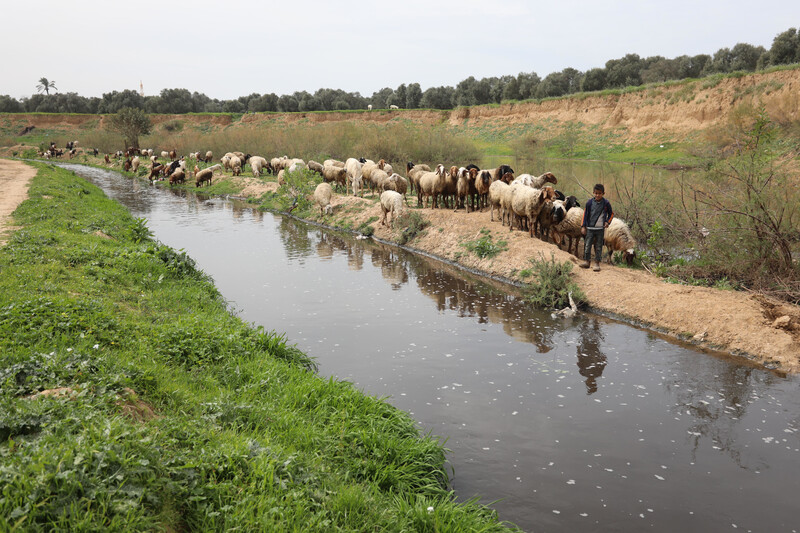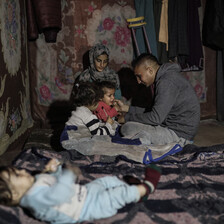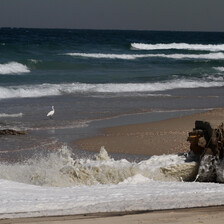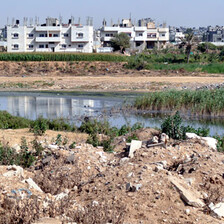The Electronic Intifada 13 April 2022

A new project launched in March seeks to clean up Wadi Gaza and return it to the nature reserve it once was.
APA imagesIt could be a much-needed nature reserve, a lung for Gaza’s imprisoned 2 million strong population whose movement is curtailed by an Israeli blockade that goes back over 15 years.
That, at least, is what the UN hopes as it embarks on a project to clean up Wadi Gaza, a 105 km long valley that starts in the South Hebron Hill, snakes its way through the Negev desert and dissects the Gaza Strip near its middle for nine km before ending in the Mediterranean Sea.
The project has its work cut out though. For years, the valley has been used as a garbage dump, one of few open spaces in an overcrowded strip of coastal land that, until recently, had no sewage system because Israeli restrictions prevented its inhabitants from developing their infrastructure.
Only on 23 March did the territory open its first wastewater treatment plant, a plant that had been held up for years because of Israeli prohibitions on what Palestinians in Gaza can import.
In that time, much damage has been wrought to the valley, not least to those in the vicinity.
Muhannad al-Oweidat, 19, is a university student who suffers from severe asthma.
“We close all the windows of our house at night, especially in hot weather, to avoid the smell of burning waste entering the house,” Muhannad told The Electronic Intifada. “There are lots of mosquitos and insects.”
Gaza produces around 2,000 tons of solid waste per day or an average of 730,000 tons annually, according to the UN. This is the equivalent of one kilogram of waste per person per day, with variations between cities and villages.
Nearly two-thirds of the solid waste is organic, said Dr. Abdelmajid Nassar, a professor of environmental engineering at the Islamic University of Gaza. Eleven percent, according to a 2015 study he authored, is plastic, 12 percent paper and carton waste, 7 percent metallic waste, and 5 percent unspecified.
Absent space for safe landfills and even with the new wastewater treatment plant, which will cater to half Gaza’s population, such high numbers are dangerous in Gaza’s crowded environs, Nassar said, and are only set to rise.
In 2020, he estimated total waste would have reached 2,230 tons per day, rising with Gaza’s population.
Smoke and hazards
It’s not just that Wadi Gaza has become a dump. In order to get rid of the waste, people also burn their rubbish.
The resulting smoke, however, can contain noxious gases and, in someone like Muhannad, this can leave him in need of immediate medical attention.
His sister, Dania, 20, is studying to become a mechatronics engineer. She has always dreamt of creating a device that would help her brother by filtering air pollution.
“My graduation project is going to be about water filtration, and hopefully I can benefit the Wadi before Israel destroys it again.”
The area suffers regular flooding. In Gaza, they blame these flash floods on a series of water overflow reservoirs and dams built in Israel that are periodically opened and cause havoc.
The floods displace residents and kill livestock and crops.
Muhammed Abu Maala, 38, is a physiotherapist who has lived all his life in the area of Wadi Gaza, where he also cultivates some land.
He too blames Israel for much of the damage wrought.
“The occupation’s construction of dams near the borders of the Gaza Strip, to collect and trap rainwater, dried up the valley,” Abu Maala told The Electronic Intifada. “The intermittent water supply in the valley led to sediments and waste remaining at the bottom of the valley. This generated toxic pollutants that killed the fish that lived in the valley, and also led to a migration of the rare birds from it.”
He vividly recalls when the valley was still home to flowers and wildlife.
“I remember playing in the valley, looking at birds and breathing the aroma of beautiful flowers. This has all disappeared,” he told The Electronic Intifada.
Today, he said, he believes his crops are at risk due to the Wadi Gaza wastewater, a fear borne out by bitter experience.
Lands next to the valley are usually barren, though it wasn’t always like that. In the past, Abu Maala said, people used to grow cucumbers, tomatoes, cabbage and zucchini in the area.
Now none of this will grow because wastewater goes deep in the soil and affects crops and vegetation.
His daughter, Sawar, 10, is always complaining of fevers and headaches, moreover.
“I am always taking her to see doctors, and they tell me that this is a virus caused by insects and noxious fumes. It is probably because we live next to the Wadi.”
A health risk
The head of the National Institute for Environment and Development, Ahmad Hilles, noted that Wadi Gaza’s is a unique ecosystem that should enjoy rich biodiversity in flora and fauna.
Hilles said the valley faces many crises, mostly the untreated sewage and the flooding caused by the upstream dams. In addition to the flood damage, the dams deprive the valley of millions of cubic meters of freshwater a year.
“The valley, which was a nature reserve, disappeared. Even the wild ducks, storks, and gulls have stopped coming here because the valley turned into a garbage dump and an estuary for sewage,” Hilles added.
Farms and poultry production have also been affected by the pollution of the valley.
Naama al-Awdat, 60, owns a poultry farm in the area.
“I always suffer when I work, especially in the summer. Mosquitos and insects surround me and there’s the smell of sewage.”
All this adds up, she told The Electronic Intifada.
“It affects the quality of eggs and chicken. The polluted air and water that chickens feed upon will produce poor-quality eggs and meat. This is putting our health at risk, as there is no food security. We farmers have no choice because we own those lands, and it is our only source of income.”
Samar Abu Safiya is an agricultural engineer with Gaza’s ministry of agriculture. Polluted water and air, along with Gaza’s hot temperatures, are the main factors behind the problems faced by farmers in the area, whether they grow crops or raise livestock and poultry.
“The lands need to be invested in the perspective of farmers. Right now, they produce polluted food for their families. We, in the ministry of agriculture, hope to get special funding for those farmers as they incur huge losses.”
She also blamed Israel for what she described as an intentional attack on farmers.
“Israel opens dams on purpose every winter because they want to harm farmers and destroy their crops. This is an ongoing assault.”
The author is a freelance writer and translator from Gaza, Palestine.





